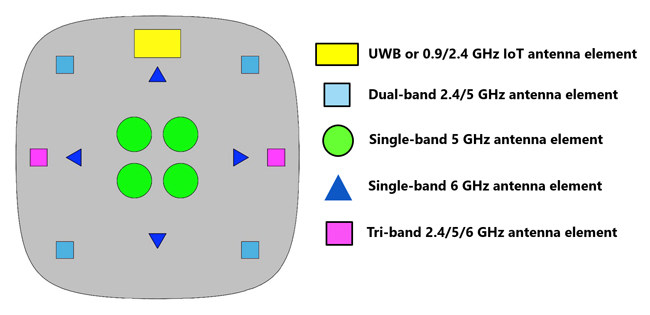The Antenna Company today announced a Wi-Fi 6E MIMO antenna system designed to increase network capacity, extend range and reduce latency in enterprise and industrial IoT networks. The antenna system enables simultaneous operation in the 2.4, 5 and 6 GHz frequency bands, resulting in an additional 1.2 GHz of spectrum and greater than 2x increase in available channels.
Optimized for integration into access points, The Antenna Company’s design supports a total of 15 antennas, including dedicated 4 x 4 5 GHz + 4 x 4 6 GHz + 4 x 4 2.4/5 GHz Wi-Fi antennas. Cross-pair Wi-Fi antenna isolation of greater than 45 dB is achieved for concurrent operation in the 5 GHz band.

“The adoption of high performance Wi-Fi 6E antenna systems is a key enabling technology to fully realize the benefits of the unlicensed spectrum between 5.925 and 7.125 GHz”, said Mark Hung, VP of technology and engineering at the Wi-Fi Alliance.
An additional 0.9/2.4 GHz IoT antenna is included to enable IoT use cases, along with tri-band 2.4/5/6 GHz antennas for radio spectrum management. The entire antenna system is mounted on a metal backplate to enable mechanical, thermal and RF integration with the access point.
The design also comes with an ultra-wideband (UWB) option to enable Real-Time Location System (RTLS) services, such as access control, indoor navigation, asset tracking and contact tracing. The UWB antennas support channels 5 and 9 for worldwide spectrum coverage. To avoid coupling and detuning between antennas, greater than 30 dB isolation is achieved between the UWB and Wi-Fi antennas.
The Antenna Company’s Wi-Fi 6E + UWB antenna system also features:
- Compact design enabling size reduction of enterprise access points by at least 20 percent without sacrificing antenna system performance.
- Low input impedance, which is essential to achieve peak data rates for 80/160 MHz channels.
- Uniform radio coverage to avoid nulls and blind spots.
“Wi-Fi 6E enables the capacity, speed and latency needed to support the shift in network usage for enterprise and industrial IoT markets. The addition of UWB gives our customers a scalable platform to offer new RTLS services”, said company CEO David Favreau.

